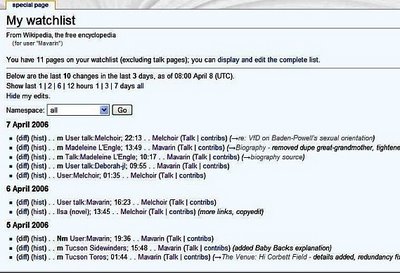
Random photo of somewhere, taken sometime.
Each night the thwarted pilgrims left,
Some early, others staying ’til
Their eyelids pressed on reddened eyes
And legs could scarcely stagger off.
--From Pilate's Answer by KFB
Some early, others staying ’til
Their eyelids pressed on reddened eyes
And legs could scarcely stagger off.
--From Pilate's Answer by KFB
This is one of those nights when exhaustion presses down upon me, and bids me, "Stop. Sleep."
I've been watching a show about John and Abigail Adams. You can tell, can't you?
I really am extremely tired, though, so I'm not going to spend the next three hours writing this, as I so often do. I'm just going to write about a few things that happen to be passing through my brain at the moment, post a randomly-chosed photo,and go to bed.
You can probably guess why I'm like this tonight. Yes, I've gone too many nights with too little sleep - again. This time it's largely because of Wikipedia. I resisted tinkering with it for a long time, but the idea of being able to write an encyclopedia article tonight and know that a student may consult your words tomorrow is a powerful one. So last night I wrote a better L'Engle bio than the one I did for my own L'Engle site years ago. I was really happy about doing this - and I stayed up too late last night, tinkering.
It sounds crazy, really, that anybody with an online connection can write or edit an encyclopedia. What's to stop some kid from filling Wikipedia with nonsense? What's to stop me from writing that Madeleine L'Engle was born in the land of Yongy Pongy Po, or worse, making a plausible claim that is nevertheless completely false?
I personally would never do anything like that, of course. Truth and the dissemination of knowledge are too important to me to write something that isn't true, unless I'm clearly and obviously writing fiction. But yes, people put junk into Wikipedia entries all the time. You probably won't see it, though. Wikipedians will soon set it right again.
It's an interesting bit of social engineering, really. Wikipedia is patrolled and nurtured by a large coterie of computer literate people who are deeply interested in some subject or other. They are geeks and academics, scholars and writers, researchers and fans. The way it works is this. Our hypothetical Wikipedian, Joe, is an expert on the history, manufacture and cultural implications of cardboard boxes. One day Joe Googles his favorite subject, and comes across Wikipedia. If he is happy with the article that turns up, further exploration may ensue. Eventually, he comes across something that's too short, or poorly written, or a little inaccurate. Since the Joe really cares about the subject, he wants Wikipedia to get it right, even if it means doing the work himself. So he fixes the deficiency. If he has registered with Wikipedia (without which you can edit, but can't start an article), the site immediately offers to put that page on Joe's watchlist.
Well, having fixed it once, Joe has an interest in seeing that that page stays accurate. So he keeps on eye on his watchlist, which soon fills about with pages about cardboard and corrugation, cereal boxes and shipping. If some "vandal" comes along and messes up one of "his" pages, he'll soon put it right.
That's the concept, but I'm not Joe, and my interests are a bit different. Here's my watchlist page:

Most of the things on it were last modified by me, so I know what's on them. A few others were modified by someone with the handle"Melchoir" (sic). Melchoir cleaned up a few rookie mistakes in formatting on my Ilsa page, and formally welcomed me to the community. He patrols mostly math-related articles. Today I fielded a question about the L'Engle bio from someone else, who keeps an eye on children's literature, especially fantasy and sf. In the few days I've been doing this stuff, Melchoir has already cleaned up after one vandal on the L'Engle page. I have no doubt that the children's lit woman would do the same if she happened to come across it first.
Sure, there can be controversies, even heated discussions on the behind the scenes "Talk" pages. Overall, though, I think it works extraordinarily well. There is a lot of collaboration, and a shared sense of responsibility, the idea that something important is being accomplished.
On the other hand, as writer Cory Doctorow has pointed out, the fact that the English edition of Wikipedia is mostly written by consumers of online culture results in some subjects being overrepresented, while others are neglected. You can find out pretty much anything and everything about The Simpsons on Wikipedia, but not very much (relatively speaking) about the nation of Burundi, or Byzantine Art. We'll get there, though.
That wasn't what I was going to talk about tonight, at least, that's not all I was going to talk about. But it's late, so I'll save the story of Karen the I.T. Consultant for tomorrow.
Karen
2 comments:
I have speculated about the possibility that Wikipedia is the genesis of the future Hitch Hikers' Guide to the Galaxy, "for though it has many omissions and contains much that is apocryphal, or at least wildly inaccurate..."
The concept, that people who know less will leave an entry alone, and people who know more will edit an article to make it more accurate, is nice, but a little bit naive, I think. For one thing, "a little knowledge is a dangerous thing," and many who think they know will regularly add bad information to articles. For another, topics that are politically charged often turn into edit wars with people on one side of an issue changing an entry, and peopleon the other side changing it back again virtually as infinitum.
Wikipedia is a great place to start for a general overview of any topic, but should never be used for any serious research.
I agree with Paul on this one. I always try for at least 4 points of reference on any topic. I remember hearing a while back, around December I think, about the tampering that was going on. I don't think I would want to depend on them solely for my source of research info.
Post a Comment